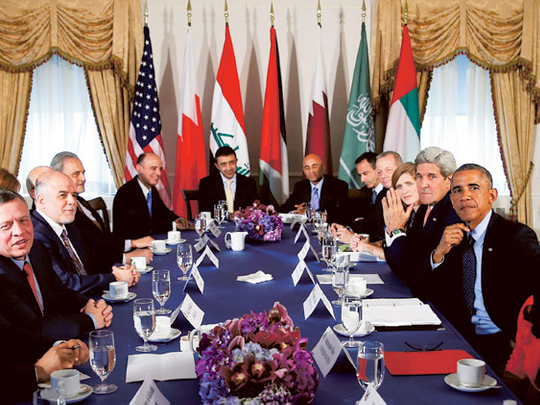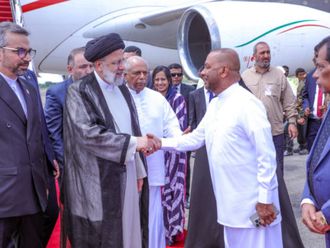
Amman: It was a telling contrast: a high-profile shout-out on Tuesday from President Barack Obama to Arab allies who joined in US-led airstrikes against Islamist militants in Syria — coupled with cautious, distancing and sometimes belated statements from the Arab states involved.
The sharply different public postures suggested that the Obama administration still faces an uphill fight to galvanise regional allies for a long offensive against Daesh, whose fighters have seized an arc of territory in Syria and Iraq, enforcing its rule with crucifixions and beheadings and prompting tens of thousands of civilians to flee.
“This is not America’s fight alone,” Obama declared on Tuesday, listing a roll call of Arab states that had taken part in the initial air strikes: Jordan, Saudi Arabia, the UAE, Bahrain and Qatar. The United States, the president asserted, was “proud to stand shoulder-to-shoulder” with these allies.
But for a variety of reasons, analysts say, most Arab states are reluctant to take on overtly visible roles in a US-led military coalition. Some fear direct retaliation by Daesh. Others worry about inflaming their own home-grown extremists, or do not want to act in ways that will advance the agenda of their regional rivals, particularly as concerns the combustible divide between Sunnis and Shiites.
And if the American-led campaign escalates to a ground battle, Arab states are almost certain to step back, said Egyptian analyst Jamal Sultan.
“It would be almost impossible for any Arab nation to take part in sending ground troops to fight [Daesh] under US supervision,” he said. “If that happened, only then could we talk about real Arab participation in the fight.”
As regional ambivalence goes, Jordan is a case in point. The long-time dependable US ally, was the first of the five Arab allies to disclose its role in the air strikes. While acknowledging in a military statement early on Tuesday that its warplanes had bombed militant targets in Syria, Jordan emphasised that it acted in self-defence and did not directly refer to working in concert with the United States. Nor did it specify that Daesh was a primary target.
“Planes from the Royal Jordanian Air Force destroyed several selected targets of terrorist groups that had made it their practice to send elements to carry out sabotage” in Jordan, the military statement said, adding that its warplanes had returned safely to base.
Hours later, other partners in the campaign of strikes weighed in, emphasising fraternal Arab relationships but avoiding any reference to a Washington-led campaign. The UAE said in a carefully worded statement that its first strikes against Daesh targets were “carried out in cooperation with the forces participating as part of the international effort.” In Bahrain, the official Bahrain News Agency cited an unidentified air force official as saying it had carried out strikes “in cooperation with the air forces of brotherly [Gulf] states and forces of our allies.”
The five participants were among ten Arab states that this month signed a communique supporting the American-led campaign against Daesh. At the time, Secretary of State John Kerry was unable to secure the backing of regional heavyweight Turkey, a North Atlantic Treaty Organisation (Nato) ally that only last week won the release of 49 hostages taken by Daesh from Turkey’s consulate in the Iraqi city of Mosul in June.
Turkey, inundated with tens of thousands of refugees from Daesh’s push into Kurdish villages in Iraq, says the US needs to assess its own culpability.
Turkish President Recep Tayyip Erdogan, speaking on Monday to members of the Council on Foreign Relations, said Daesh “is using weapons. Whose weapons are they? In Iraq, those are the weapons that the United States gave to Iraq ... and those tanks, artillery have become part of the occupation effort” by the group.
Different priorities
Despite Tuesday’s show of unity, the alliance may yet be hobbled by a number of issues. Some of the Arab nations, notably Saudi Arabia and Qatar, have different priorities in the conflict, believing that fighting the Syrian government is more important than pursuing the narrow counterterrorism mission that Obama has in mind. As the fight goes on, they may well press the US to broaden its campaign.
“Having different members of the coalition pulling in different directions could be harmful to the coalition, and it raises the risk that countries like the United States will get in deeper than they wanted,” said Julien Barnes-Dacey of the European Council on Foreign Relations. “Saudi Arabia would like to see the United States escalate this campaign.”
The Sunni-Shiite competition for influence has played itself out in proxy conflicts in Syria, Libya, Iraq and Yemen, though one sign of a potential thaw came this week when the foreign ministers of Iran and Saudi Arabia met on the sidelines of the UN General Assembly. It was the highest-level such meeting since the election last year of Iranian President Hassan Rouhani.
In taking on Daesh, US officials have portrayed an active Arab role as crucial. But even solid allies such as Jordan, which shares a combined 555-km border with Syria and Iraq, had long resisted being dragged into their confrontations, other than clamping down on border incursions.
“Most people support Jordan in fighting terrorism, but with great caution, because there are groups that fear that this may affect Jordan’s stability through reprisal attacks,” said Fahd Khitan, an Amman, Jordan-based political analyst.
And some in Jordan say flatly that Daesh is not the enemy.
“We are against Jordan being a part of any alliance with America, which is the source of all of these problems in the first place,” said Hamza Mansour, head of the Muslim Brotherhood’s Islamic Action Front, the largest opposition group in the country.
Jordan’s overwhelmingly Sunni population has been a major source of recruits for rebel groups fighting the Syrian government, including the Al Qaida-affiliated Nusra Front. Daesh also has a measure of local support.
A militant group based in Ma’an, a perennially restive city 225 km south of Amman, in April pledged allegiance to Abu Bakr Al Baghdadi, Daesh’s leader. On Sunday, the Jordanian government detained 11 suspected Daesh militants, accusing them of plotting attacks in the kingdom.












